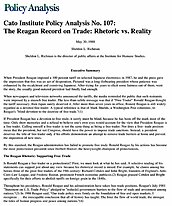When President Reagan imposed a 100 percent tariff on selected Japanese electronics in 1987, he and the press gave the impression that this was an act of desperation. Pictured was a long-forbearing president whose patience was exhausted by the recalcitrant and conniving Japanese. After trying for years to elicit some fairness out of them, went the story, the usually good-natured president had finally had enough.
When newspapers and television networks announced the tariffs, the media reminded the public that such restraints were imposed by a staunch free trader. The less-than-subtle message was that if “Free Trader” Ronald Reagan thought the tariff necessary, then Japan surely deserved it. After more than seven years in office, Ronald Reagan is still widely regarded as a devoted free trader. A typical reference is that of Mark Shields, a Washington Post columnist, to Reagan’s “blind devotion to the doctrine of free trade.”(1)
If President Reagan has a devotion to free trade, it surely must be blind, because he has been off the mark most of the time. Only short memories and a refusal to believe one’s own eyes would account for the view that President Reagan is a free trader. Calling oneself a free trader is not the same thing as being a free trader. Nor does a free- trade position mean that the president, but not Congress, should have the power to impose trade sanctions. Instead, a president deserves the title of free trader only if his efforts demonstrate an attempt to remove trade barriers at home and prevent the imposition of new ones.
By this standard, the Reagan administration has failed to promote free trade. Ronald Reagan by his actions has become the most protectionist president since Herbert Hoover, the heavyweight champion of protectionists.
About the Author

This work is licensed under a Creative Commons Attribution-NonCommercial-ShareAlike 4.0 International License.
